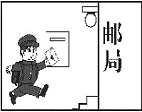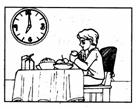
题目列表(包括答案和解析)
Zach Linsky, 11, watches TV for 3 and a half hours a day and plays video games every other day. Zach, a sixth grader in Washington, D. C., is an American. But unlike many kids, he doesn’t have a TV, VCR, or computer in his bedroom. He only has a boom box (手提录音机).
The survey of 3,155 kids, aged 2 to 18, shows that they spend 5 hours and 29 minutes on average(平均的) a day using some types of media outside of school, including 2 hours and 46 minutes watching TV, 21 minutes on the computer, 20 minutes playing video games, and 8 minutes on the Internet. The good news: The total includes 44 minutes spent reading.
The survey also shows that those aged 2 to 7 spend 3 hours and 9 minutes watching TV every day and shows that 32 percent in that age group have TV sets in their rooms. Among those aged 8 to 18, 21 percent have computers in their rooms, 65 percent have TV sets, and 61 percent say their parents don’t stop them from watching TV. Nearly 1 in 4 say they watch more than 5 hours a day.
“Kids are living much more lonely lives than ever before,” says Kay S. Hytnowitz. “They just disappear into their rooms and spend all of their time with these media.”
1.At what age do children in America spend about five and a half hours on the media a day?
|
A.Aged 2 to 7. |
B.Aged 2 to 18. |
C.Aged 8 to 18. |
D.Aged 2 to 11. |
2.How long do kids aged 2 to 18 spend reading?
|
A.46 minutes. |
B.21 minutes. |
C.20 minutes. |
D.44 minutes. |
3.How many kids aged 2 to 7 have TV sets in their rooms?
|
A.32%. |
B.21%. |
C.61%. |
D.40%. |
4.Why do the children spend all of their time with these media? Because _______.
|
A.they have too much free time |
|
B.they feel very lonely |
|
C.they like these media |
|
D.they want to find out something |
5.What’s the problem of the kids in America according to the passage?
|
A.There are too many media now. |
|
B.Kids spend too much time on the media. |
|
C.Kids are too fat. |
|
D.Kids would rather be with friends than the TV. |
Sophia is very happy these days. The 13-year-old girl from the UK has a lot of fun during her trip in Beijing. She eats dumplings, tries Chinese calligraphy(书法), climbs the Great Wall and speaks Chinese, all for the first time!
She even stays with a Chinese family for a week. “Beijing is very big and beautiful. And the people here are very nice!” She says. Sophia comes with her teachers and classmates from the UK. The students in Shangdi Experimental Primary School of Haidian District receive them. These two schools are “Heart to Heart” schools. There are 200 “Heart to Heart” schools in Beijing. Each of them has a partner school in a foreign country. They meet and get to know each other.
1.How old is Sophia?
|
A.15 |
B.14 |
C.13 |
D.11 |
2.How long did Sophia stay with a Chinese family?
|
A.Two days. |
B.Seven days. |
C.A year. |
D.6 months. |
3.What did Sophia think of Beijing?
A. Big. B. Beautiful. C. Exciting. D. A and B.
阅读理解
Zach Linsky, 11, watches TV for 3 and a half hours a day and plays video games every other day. Zach, a sixth grader in Washington, D. C., is an American. But unlike many kids, he doesn’t have a TV, VCR, or computer in his bedroom. He only has a boom box (手提录音机).
The survey of 3,155 kids, aged 2 to 18, shows that they spend 5 hours and 29 minutes on average(平均的) a day using some types of media outside of school, including 2 hours and 46 minutes watching TV, 21 minutes on the computer, 20 minutes playing video games, and 8 minutes on the Internet. The good news: The total includes 44 minutes spent reading.
The survey also shows that those aged 2 to 7 spend 3 hours and 9 minutes watching TV every day and shows that 32 percent in that age group have TV sets in their rooms. Among those aged 8 to 18, 21 percent have computers in their rooms, 65 percent have TV sets, and 61 percent say their parents don’t stop them from watching TV. Nearly 1 in 4 say they watch more than 5 hours a day.
“Kids are living much more lonely lives than ever before,” says Kay S. Hytnowitz. “They just disappear into their rooms and spend all of their time with these media.”
1.At what age do children in America spend about five and a half hours on the media a day?
|
A.Aged 2 to 7. |
B.Aged 2 to 18. |
C.Aged 8 to 18. |
D.Aged 2 to 11. |
2. How long do kids aged 2 to 18 spend reading?
|
A.46 minutes. |
B.21 minutes. |
C.20 minutes. |
D.44 minutes. |
3.How many kids aged 2 to 7 have TV sets in their rooms?
|
A.32%. |
B.21%. |
C.61%. |
D.40%. |
4.Why do the children spend all of their time with these media? Because _______.
|
A.they have too much free time |
|
B.they feel very lonely |
|
C.they like these media |
|
D.they want to find out something |
5.What’s the problem of the kids in America according to the passage?
|
A.There are too many media now. |
|
B.Kids spend too much time on the media. |
|
C.Kids are too fat. |
|
D.Kids would rather be with friends than the TV. |
(一)交际应答。录音中有五个句子,每个句子听一遍,然后从每小题A、B、C中选出能对每个句子做出适当反应的答语。
1.A.Yes, please. B.Good idea. C.Of course, it is.
2.A.Certainly you are. B.Sure. Hold on, please. C.I’ll do that.
3.A.Oh, they are over there. B.I’m glad you’ve found it. C.Go straight and turn left.
4. A.OK, I wil. B.Yes, I think so. C.Good for you.
5.A.Never mind. B.You are welcome. C.I’m sorry.
(二)情景反应。录音中有五组对话,听对话两遍后,从每小题A、B、C中选出能回答所给问题的正确答案。
6.When will Mrs White come back?
A.Right now. B.Quite soon. C.At four.
7.What sport does the woman like?

8.What does the woman prefer to do?
A.To see the new play. B.To do some shopping. C.To visit the museum.
9.What are the man and woman doing?
A.They are looking for a CD player in a shop.
B.They are learning how to press the button.
C.The man is teaching the woman how to use the CD player.
10.Why was Frank on the news last night?
A.He walked along the beach at night.
B.He swam alone in the cold water.
C.He got the boy out of water and saved him.
(三)对话理解。录音中有一段对话,听对话两遍后,从每小题A、B、C中选出能回答所给问题的正确答案。
11.Where could the dialogue happen?
A.In a shop. B.In a library. C.In a hospital.
12.Why did the young man go to see the doctor?
A.He didn’t know where to begin his talk.
B.He felt difficult to fall asleep.
C.He felt unhappy most of the day.
13.How long has the young man been ill?
A.For about two years. B.For about three weeks. C.For about six months.
14.In what season did the young man feel worse?
A.In Spring. B.In Autumn. C.In winter.
15.What did the doctor ask the young man to do?
A.To take some medicine. B.To burn away his worries. C.To take more exercises.
(四)短文理解。录音中有一篇短文,听短文两篇后,从每小题A、B、C中选出能回答所给问题的正确答案。
16.What happened to the three boys in a cold day?
A.They lost their way.
B.They couldn’t find the big house.
C.They had to spend the night in the open air.
17.What did the three boys ask the farmer to do?
A.To give them some water and food.
B.To let them stay in his house for a night.
C.To tell them the way to walk out of the forest.
18.Why did one of the boys have to sleep in the big house?
A.The farmer didn’t like the third boy.
B.One of the boys made a loud noise when he slept.
C.There wasn’t enough room in the farmer’s house.
19.Who was the first to sleep with the horses?
A.Mike B.Jack C.Tom
20.Why were all the horses outside at the house door?
A.Because someone drove them out of the house.
B.Because the smell in the big house was really terrible.
C.Because the horses didn’t like to stay with people at night.
听力测试
(一)听句子,选择与画面一致的选项。每个句子听一遍:




1. ( A B C ) 2. ( A B C ) 3. ( A B C ) 4. ( A B C )
(二)、请听句子,选出恰当的答语。每个句子听一遍:
( )5. A. It’s Sunday. B. It’ April 21. C. It’s half past eleven.
( )6. A. It’s very hot. B. It’s very heavy. C. It’s very large.
( )7. A. Yes, please. B. You are welcome. C. Sorry, I can’t.
( )8. A. No, it isn’t. B. Yes, it is. C. Thank you.
( )9. A. About 40 minutes.
B. About half an hour’s walk.
C. About 5 meters long.
( )10. A. I think it is interesting.
B. I like a story.
C. I’m reading.
(三)听对话,宣战正确答案。每组对话听两遍。
( )11. When was Edison born?
A. In 1874. B. In 1931. C. In 1847.
( )12. Why wasn’t the boy at school yesterday?
A. He had to look after his mother.
B. He had to look after his father.
C. He was ill in bed.
( )13. What’s the woman’s telephone number?
A. 3897244. B. 3879224. C. 3789244.
( )14. Why was the girl late again for school?
A. She was ill. B. She got up late. C. She met a traffic accident.
( )15. When does the dialogue happen?
A. During class. B. After class. C. Before class.
( )16. What does the girl’s mother do?
A. A nurse. B. A doctor. C. A worker.
( )17. What size does the man wear?
A. The large size. B. The small size. C. The medium size.
(四)对话理解: 对话听两遍:
听第一段对话,回答第18-21小题。
( )18. What’s wrong with the boy?
A. He’s got a headache. B. He’s got a high temperature.
C. He’s got a cold.
( )19. How long has he been like this?
A. For one day. B. For two days. C. For three days.
( )20. Is he seriously ill?
A. Yes, he is. B. Yes. But he will be well soon. C. No, he isn’t.
( )21. How many times should he take the medicine a day?
A. One time. B. Two times. C. Three times.
听第二段对话,回答第22-25小题。对话听两遍:
( )22. Where does the man want to go?
A. London. B. Hong Kong. C. America.
( )23. When will he go there?
A. June 29th. B. June 30th. C. July 1st.
( )24. When will the earliest flight leave?
A. At 7:00 in the evening. B. At 8:00 in the morning.
C. At 7:00 in the morning.
( )25. Does it stop in Beijing?
A. Yes, it does. B. No, it doesn’t. C. We don’t know.
(五)听短文回答问题,短文听两遍。
( )26. Where did Mr. White work?
A. France. B. America. C. England.
( )27. Why was Mrs. White angry?
A. Her husband wouldn’t go to see their son.
B. Her husband was hit by a car.
C. Her husband didn’t love her.
( )28. How did Mr. and Mrs. White go to Paris?
A. By ship. B. By train. C. By plane.
( )29. Mr. White didn’t know how they had got to Paris because _____ on their way.
A. he was asleep
B. he was thinking about his work
C. he was worried about his son
( )30. From this passage we know_____.
A. Mr. White loved nobody except himself
B. Mr. White couldn’t get on well with anybody
C. Mr. White was always interested in his work
湖北省互联网违法和不良信息举报平台 | 网上有害信息举报专区 | 电信诈骗举报专区 | 涉历史虚无主义有害信息举报专区 | 涉企侵权举报专区
违法和不良信息举报电话:027-86699610 举报邮箱:58377363@163.com